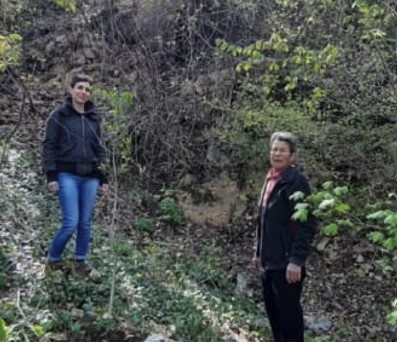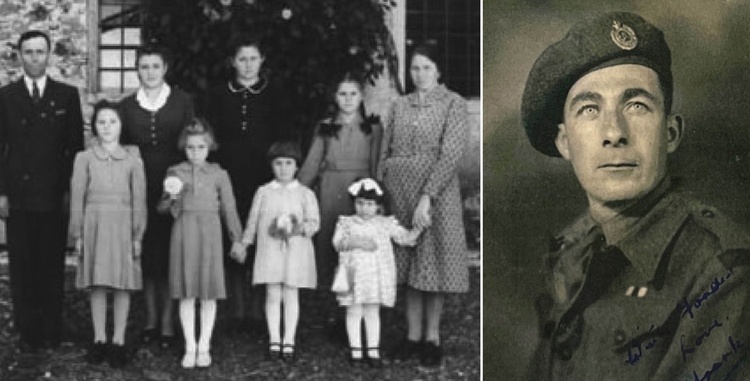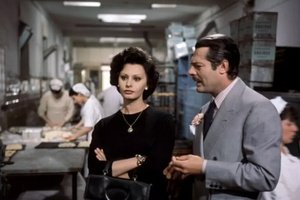A lasting bond developed between him and one of the soldiers, Frank Ashford.
After decades of letters and memories, their families will meet for the first time in Melbourne.
Their friendship has remained suspended in time, flourishing in an age of torture and hunger, surviving unspeakable conflicts and distance.
Attilio Pezzato and Frank Ashford first crossed paths on the hills of Lessinia, in the small town of Vestenanova in Veneto.
For the rest of their lives, they reminisced via yellowed letters, stringing each other along an eternal avenue of memories.
Francesca Rama, Attilio's granddaughter, and Peter Ashford, Frank's second son, are the custodians of this touching story of affection and gratitude.
A little less than fifty kilometres from Verona, Attilio Pezzato and his wife Giustina Dal Zovo lived in a modest house, with a stable in the 'Pezzati' district.
At the outbreak of the Second World War, they had been married for about eight years and had three daughters.
In 1943, with the first act of the Badoglio Government, Italy declared war on Germany.
For the family, their lives had changed within a changing world as their fourth child was born.
Days of fear and poverty followed, and on the eve of the Nazi-fascist response, some partisans arrived in the district with two English soldiers, Frank and Armand.
They were fleeing from the labour camp and prison in the basalt quarry of Montecchia di Crosara.
The locals were asked to protect them in some way while other soldiers had been transferred to nearby districts.
Attilio and Giustina answered the call: Giustina delivered clean clothes and food from "what little was available” and gave them the opportunity to wash.
Attilio, on the other hand, brought them newspapers to read. The friendship between Frank and Attilio began to flourish.
“Frank could speak a little Italian, he was the only one in his family who had studied. Attilio was happy to help him,” said Bev Ashford, daughter-in-law of the English soldier.
“They were really very close, perhaps because they both had four children and, in that sense, they had discovered that they had a lot in common."
The Germans, however, were already in the area and when it seemed too dangerous to be near the inhabitants of the village, Frank and Armand hid away in a quarry dug on the side of a valley, in a rugged cliff in the woods.
In order to not leave footprints while delivering food to the two soldiers, Attilio used a basket attached to a pole in order to smooth the ground.
In moments of relative peace during the freezing winter evenings, family stories and memories were shared inside the stable heated by animals.
In January 1945, Frank and Armand suddenly left the district, without saying goodbye to anyone.
The night before, they had spent hours chatting cheerfully with Attilio, Giustina, their daughters and other friends within the neighbourhood.
Attilio felt deeply hurt and, at the same time, immensely worried about their fate.
At the end of the Second World War, the inhabitants of the village carried with them ineffable traumas from the ferocious German reprisals in the days of 1944, which culminated on July 10.
An elderly man had been killed for no reason by the Germans while walking along a path, two brothers aged 15 and 16 had also been shot dead.
The German troops had reached as far as the Pezzati district where they rounded up the men, locked them in a house and burned them alive.
In the previous days, the parish priest of San Pietro Mussolino was also killed and burned in the churchyard, in front of his mother.
It was the same story of death and destruction in many other neighbouring districts.
Attilio, just like Frank and Armand, had managed to escape and hide.
Giustina stayed home with her daughters, forced to stand for hours in the courtyard with a machine gun ready to fire.
In 1949, Attilio and Giustina received a letter bearing Frank's signature.
In the letter, written in the Italian learnt from the wire and reading newspapers that Attilio passed him, Frank said he was "eternally grateful" for everything they had done for them.
He said he left Vestenanova without warning because he was "scared of the idea of putting them in danger".
When they left the country, however, Frank and Armand decided to go north, while their companions went south.
“We were really unfortunate because at first we were all together, then at the last moment we decided to go our separate ways,” he wrote.
“So they got free and we were taken as prisoners of war in Germany for another six months.”
Frank returned to England in May 1945 where he was finally reunited with his wife and sons: John, Peter, Robert and Brian.
Unfortunately, difficult years followed, improved occasionally only by the letters between the two friends.
Then, for five years, nothing.
In the meantime, Attilio experienced immense joy at the birth of his last three daughters, when in 1954 news finally arrived from his English friend.
Frank had moved to Melbourne, taking advantage of job opportunities, and their fifth daughter Jeanette had also been born.
Then, in 1973, Attilio left a great void in his family.
At the end of his days, his thoughts travelled to that dear friend never forgotten.
Before he died, he asked his wife to inform Frank of his passing.
A letter left Vestenanova for Melbourne bearing the news.
In his response, Frank opened up about his own period of suffering that came from the loss of one of his children, who passed away at the age of 37.
“As a child, I spent a lot of time with my grandmother and my aunt Irma who always told me about everything they had seen and heard,” said Francesca Rama.

Francesca and Irma
“The story of Frank and Attilio always resurfaced between letters, Christmas cards and faded photos.”
After the death of Giustina, at the age of 90, and then of her mother, Rama decided to reach out to the Ashford family to maintain that legacy of gratitude and generosity.
Thanks to an Australian friend known from her time in London, she was able to get in touch with Peter, Frank's second son.
“I was moved, during our first call my eyes were full of tears,” said Rama.
“Frank too had passed away young in 1984, but he never forgot his Italian friend and the time he spent in Vestenanova.”
Over the last few years, the descendants of those two brave men have kept in touch.
Finally, next April, Francesca and her husband will be in Melbourne for a special visit.
"'Always remember, never forget,' Frank always said to my grandfather. And it was also the verse with which he concluded his letters,” Rama said.
“And that's why I too want to pass on this story to my children and those close to us.
“[A story] of friendship, brotherly love and hope for the future born during a dark period in which all seemed lost."












